九年级英语Unit13《We27retryingtosavetheearth!》知识点.doc
新人教版九年级英语下册Unit 13 We’re trying to save the earth!要点详解
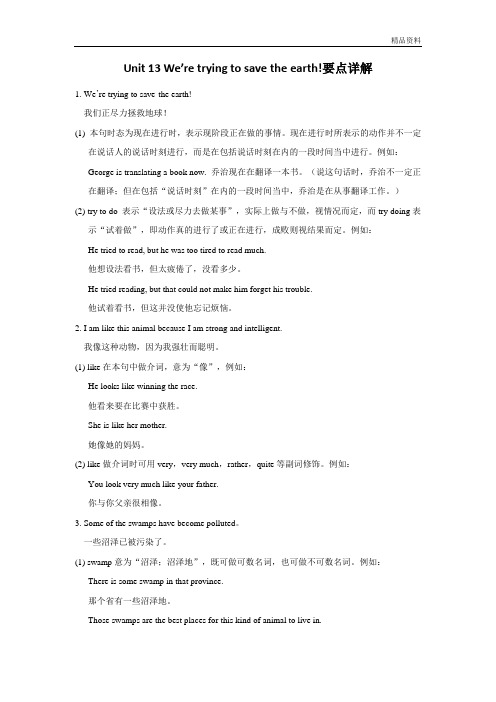
Unit 13 We’re trying to save the earth!要点详解1. We’re trying to save the earth!我们正尽力拯救地球!(1) 本句时态为现在进行时,表示现阶段正在做的事情。
现在进行时所表示的动作并不一定在说话人的说话时刻进行,而是在包括说话时刻在内的一段时间当中进行。
例如:George is translating a book now. 乔治现在在翻译一本书。
(说这句话时,乔治不一定正在翻译;但在包括“说话时刻”在内的一段时间当中,乔治是在从事翻译工作。
)(2) try to do 表示“设法或尽力去做某事”,实际上做与不做,视情况而定,而try doing表示“试着做”,即动作真的进行了或正在进行,成败则视结果而定。
例如:He tried to read, but he was too tired to read much.他想设法看书,但太疲倦了,没看多少。
He tried reading, but that could not make him forget his trouble.他试着看书,但这并没使他忘记烦恼。
2. I am like this animal because I am strong and intelligent.我像这种动物,因为我强壮而聪明。
(1) like在本句中做介词,意为“像”,例如:He looks like winning the race.他看来要在比赛中获胜。
She is like her mother.她像她的妈妈。
(2) like做介词时可用very,very much,rather,quite等副词修饰。
例如:You look very much like your father.你与你父亲很相像。
3. Some of the swamps have become polluted。
一些沼泽已被污染了。
人教版九年级英语全册Unit13We'retryingtosavetheearth!优秀教学案例
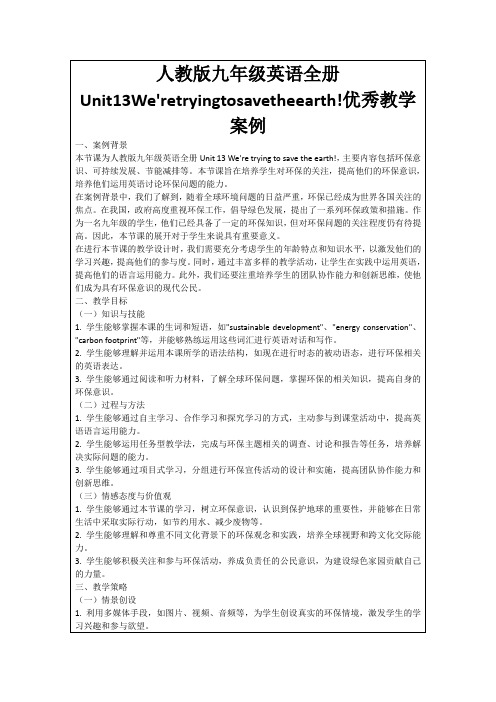
(三)情感态度与价值观
1.学生能够通过本节课的学习,树立环保意识,认识到保护地球的重要性,并能够在日常生活中采取实际行动,如节约用水、减少废物等。
2.学生能够理解和尊重不同文化背景下的环保观念和实践,培养全球视野和跨文化交际能力。
(四)反思与评价
1.教师引导学进行自我反思,评估自己在环保知识掌握和技能运用方面的进步,培养他们的自我监控和自我调整能力。
2.学生通过互评和小组评价,相互借鉴和学习,提高自己的环保意识和语言运用能力。
3.教师对学生的学习过程和成果进行综合评价,关注他们的全面发展,鼓励他们的创新和实践精神。同时,根据评价结果调整教学策略,提高教学效果。
2.学生通过完成作业,进一步巩固本节课所学内容,提高他们的语言运用能力。
3.教师对学生的作业进行评价,关注他们的全面发展,鼓励他们的创新和实践精神。同时,根据评价结果调整教学策略,提高教学效果。
五、案例亮点
1.创新的情景创设:本节课通过多媒体手段,如图片、视频等,为学生创设了丰富的环保情境,使学生身临其境地感受到环保问题的紧迫性。这种创新的情景创设方式不仅激发了学生的学习兴趣,而且提高了他们的参与度和学习效果。
四、教学内容与过程
(一)导入新课
1.教师通过展示一张地球的照片,引导学生关注地球的美丽和脆弱,引出本节课的主题——环保。
2.教师提问:“你们对环保有什么了解和看法?”让学生分享自己的知识和观点,激发他们的学习兴趣和参与欲望。
3.教师播放一段关于环保问题的新闻报道,让学生了解全球环保形势的严峻性,引出本节课的学习目标——提高环保意识,学习英语表达环保观点。
4.反思与评价的全面评估:教师引导学生进行自我反思,评估自己在环保知识掌握和技能运用方面的进步。同时,教师对学生的学习过程和成果进行综合评价,关注他们的全面发展。这种反思与评价的方式有助于培养学生的自我监控和自我调整能力,提高他们的批判性思维和创造性思维。
人教版英语九年级全册Unit13We'retryingtosavetheearth!优秀教学案例

4.对小组合作进行评价,关注学生的参与度、贡献度和团队合作效果。
(四)反思与评价
1.引导学生进行自我反思,思考自己在学习过程中的优点和不足,培养自我评价和自我改进的能力。
2.组织学生进行同伴评价,鼓励他们互相提供反馈和建议,培养评价能力和批判性思维。
3.创设问题情境,让学生面临真实的环保问题,如水资源浪费、垃圾分类等,引导学生主动思考和寻找解决方案。
4.利用多媒体技术,如视频、音频、动画等,营造生动有趣的学习氛围,激发学生的学习兴趣和积极性。
(二)问题导向
1.设计有挑战性的问题,引导学生深入思考环保问题的本质和影响。
2.通过提问和讨论,引导学生自主探究和解决问题,培养他们的批判性思维和问题境的影响。
3.总结本节课的主要内容和知识点,确保学生对环保知识有一个全面而准确的理解。
(五)作业小结
1.布置相关的作业,如研究报告、行动计划等,让学生将所学知识运用到实际生活中去。
2.要求学生在作业中提出自己的观点和解决方案,培养他们的创新思维和批判性思维能力。
3.引导学生关注环保问题的多样性和复杂性,培养他们的分析和综合能力。
4.鼓励学生提出自己的问题,激发他们的好奇心和探索精神。
(三)小组合作
1.组织学生进行小组讨论和合作,鼓励他们分享自己的观点和想法,培养合作能力和团队精神。
2.设计小组活动,如共同完成一篇关于环保的文章、策划一次环保活动等,让学生实际行动起来,提高实践能力。
3.鼓励学生在作业中积极表达自己的想法,注重培养他们的写作能力和表达能力。
4.对学生的作业进行认真批改和评价,提供及时的反馈和建议,帮助学生巩固所学知识,提高他们的学习效果。
人教版九年级英语下册Unit 13 We’re trying to save the earth!S

2.It's good for hetrlth and it doesn’t cost anything!它有利于信康,并且它不花费任何东
西!(教材第98页) be good for意为“对……有益”,反义词组be bad for意为“对……有害”。 辨析:be good for,be good at与be good with
【中考链接2】
1. (2014山东威海中考模拟) Why don't you__A _your
friends to the party? I want to meet them.
A bring
B. brings
C.leaves
D Mr Li. I A my
Unit 13 We’re trying to save the earth!
Section A 课堂精讲
【语法点精讲】
1.(1)We're trying to save the earth!我们正在 竭力拯救地球!
(2)People are throwing litter into the river.人们 正在把垃圾扔进河里。
(2) 表示现阶段正在进行的动作或存在的状态。 如: They are studying hard this term. 他们这个学期学习一直很努力。 (3)come,go,leave,arrive,start等动词用现在 进行时表示将来。 如:The bus is coming soon. 车不久就会来了。 (4)在由while(当……时候)引导的状语从句中,动
English homework at home.
-Don’t forget it to school tomorrow.
人教版九年级英语下册Unit 13 We’re trying to save the earth!

答案: 1. 垃圾 2. 底部 3. fisherman 4. advantage
5. plastic 6. wooden
Ⅱ. 短语连线 1. be full of 2. turn. . . into. . . 3. cut down 4. make a difference 5. lead to
【学以致用】
①(2014·十堰中考)—Smart phones are more and more popular
答案: 1. We’re trying 2. used to be 3. are throwing
4. 这个城镇的每个人都应该参与到清理之中!
Everyone in this town
a part in cleaning
it up!
5. 这周围的空气真的已经污染了。
The air
really polluted around here.
【自主归纳】
(1)advantage名词, 意为“优点; 有利条件”, 常用复数形式。
反义词为
, 意为“缺点; 不利条件”。
(2)advantage的常用搭配有the advantage(s) of意为“……的优
点”, take advantage of sb. 意为“占某人便宜”, take the
hands.
A. experience B. advantage C. dream
答案: take; the advantage of
this as to have big D. change
3. cost v. 花费 【语境领悟】 *It’s good for health and it doesn’t cost anything! 它对健康有好处, 并且不花任何钱! *I spent a lot of money on that holiday. 那次度假花了我一大笔钱。 *I think it’s a great idea that you now have to pay for plastic bags. 现在你得付钱买塑料袋, 我认为这是个好主意。 *It takes me forty minutes to do my homework. 做作业花费我四十分钟。
人教版九年级英语全册Unit13We’retryingtosavetheearth!教学设计
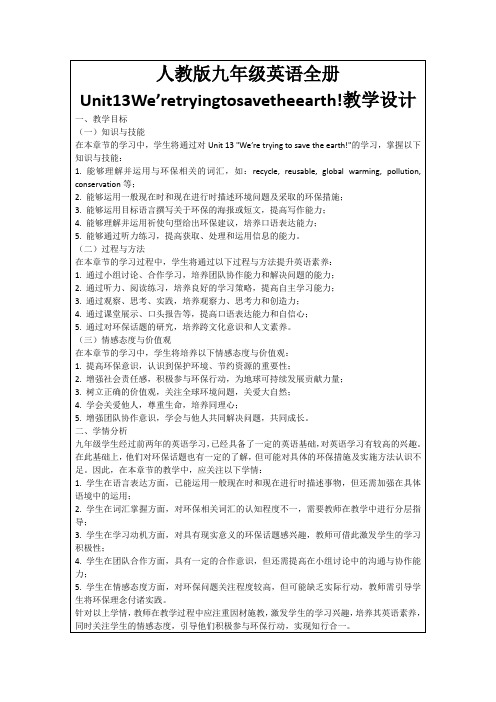
(3)海报制作:让学生分组制作环保海报,运用所学词汇和表达方式。
4.课后作业:
(1)要求学生撰写一篇关于环保的短文,巩固写作能力;
(2)鼓励学生参与环保活动,记录自己的行动和感受,提高实践能力。
5.评价与反馈:
(1)教师针对学生在课堂活动中的表现,给予及时、具体的评价;
-播放一段关于环保行动的听力材料,学生听后回答相关问题。
-教师引导学生总结听力材料中的关键信息,帮助学生提高获取、处理和运用信息的能力。
(三)学生小组讨论
1.教师将学生分成小组,每组选择一个环保主题,如:节约用水、减少塑料污染等。
2.小组内讨论以下问题:
- What are the main environmental problems related to your topic?
人教版九年级英语全册Unit13We’retryingtosavetheearth!教学设计
一、教学目标
(一)知识与技能
在本章节的学习中,学生将通过对Unit 13 "We’re trying to save the earth!"的学习,掌握以下知识与技能:
1.能够理解并运用与环保相关的词汇,如:recycle, reusable, global warming, pollution, conservation等;
1.完成课本练习册中与本课相关的练习题,特别是词汇填空、语法填空和听力练习,以加深对环保词汇和语法的掌握。
2.结合课堂所学,制作一份关于环保的海报,内容包括:环保主题、现状介绍、具体措施和建议。要求设计新颖,语言表达清晰,图文并茂。
3.撰写一篇短文,以“我的环保行动”为主题,描述自己在日常生活中实施的环保措施,以及对环保的认识和体会。字数在100-120词左右,要求使用一般现在时和现在进行时描述。
UNIT13Weretryingtosavetheearth原文与翻译

UNIT13We'retryingtosavetheearth原文与翻译《牛津初中英语》充分体现了《新课标》的诸多精神。
该教材具有两大特点。
下面是小偏整理的UNIT13We'retryingtosavetheearth 原文与翻译,感谢您的每一次阅读。
UNIT13We'retryingtosavetheearth原文与翻译SectionA1bListenandcompletethesentences.Tony:Hey,Mark,maybewecouldgoswimmingintheriverlaterthi safternoon.Mark:Idon’tthinkIwanttogo,Tony.Tony:Whynot?Mark:Iwastherelastweekendandtheriverwasreallydirty.Eventh ebottomoftheriverwasfullofrubbish,andtherewerenomorefishforf ishermentocatch.Tony:Noway!Itusedtobesoclean.Infact,ithasalwaysbeentheni cestriverinthistown.Mark:Notanymore.Ithinkpeoplearethrowinglitterintotheriver. Factoriesarealsoputtingwasteintotheriver.Tony:That’sterrible!Weshouldwritetothegovernment.Theys houldclosedownthefactories.Mark:Goodidea!ButIthinkeveryoneinthistownshouldhelptocl eanuptheriver,too.Everyoneshouldplayapart,notjustthegovernm entSectionA2aListentotheinterview.thekindsofpollutionthatJasonandSusan talkabout.Interviewer:T odaywe’retalkingtoJason andSusanaboutenvir onmentalproblems.JasonandSusan,canyoutellusaboutsomeofth eproblemsyou’veseen?Jason:Ithinkoneproblemisthattheairisbadlypolluted.Ihardlye verseeblueskiesanymore.Susan:Yes,andIusedtoseethestarsclearly.Interviewer:Whatdoyouthinkhascausedthisproblem?Susan:Well,therearemorecarsontheroadthesedays.Jason:Andfactoriesthatburncoalalsopollutetheairwithalotofb lacksmoke.Interviewer:Whatotherproblemsdoyousee?Susan:Iguessthere’stoomuchrubbishandwasteinthestreets.Jason:Yes!Everydaypeoplearethrowingawaythingslikewoode nchopsticks,plasticbowlsandplasticbags.Susan:They’realsolitteringinpublicplaces,forexample,durin gpicnicsinparks.Thisisturningbeautifulplacesintouglyones.Interviewer:You’reright.Theseareseriousproble msforourenv ironment.Next,let’stalkaboutthethingswecandotohelp.SectionA2bListenagainandcompletethesentences.Interviewer:T odaywe’retalkingtoJasonandSusanaboutenvir onmentalproblems.JasonandSusan,canyoutellusaboutsomeofth eproblemsyou’veseen?Jason:Ithinkoneproblemisthattheairisbadlypolluted.Ihardlye verseeblueskiesanymore.Susan:Yes,andIusedtoseethestarsclearly.Interviewer:Whatdoyouthinkhascausedthisproblem?Susan:Well,therearemorecarsontheroadthesedays.Jason:Andfactoriesthatburncoalalsopollutetheairwithalotofb lacksmoke.Interviewer:Whatotherproblemsdoyousee?Susan:Iguessthere’stoomuchrubbishandwasteinthestreets.Jason:Yes!Everydaypeoplearethrowingawaythingslikewoodenchopsticks,plasticbowlsandplasticbags.Susan:They’realsolitteringinpublicplaces,forexample,d urin gpicnicsinparks.Thisisturningbeautifulplacesintouglyones.Interviewer:You’reright.Theseareseriousproblemsforourenv ironment.Next,let’stalkaboutthethingswecandotohelp.SectionA2dRoleplaytheconversation.JasonandSusan,whatareyourideasforsolvingtheseproblems?Well,tocutdownairpollution,weshouldtakethebusorsubwayin steadofdriving.Yeah,orrideabike.Thereareotheradvantagesofbikeriding.It'sg oodforhealthitdoesn'tanythingGreatideas!Whataboutwastepollution?Mmm,Ithinksimplethingslikebringingabagtogoshoppingcan help.Istarteddoingthatayearago.Me,tooAlso,Inevertakewoodenchopsticksorplasticforkswhen Ibuytakeawayfood.Iusetheonesathome.Andremembertothrowrubbishinthebinsandkeeppublicplace scleanandbeautifulforeveryone.Sotogether,ouractionscanmakeadifferenceandleadtoabetter future!SectionA3aReadthepassageaboutsharksandcompletethefactsheetbelow.SavetheSharks!Manyhaveheardofsharkfinsoup.Thisfamousandexpensivedis hisespeciallypopularinsouthernChina.Butdoyourealizethaty ou’r ekillingawholesharkeachtimeyouenjoyabowlofsharkfinsoup?Whenpeoplecatchsharks,theycutofftheirfinsandthrowthesha rkbackintotheocean.Thisisnotonlycruel,butalsoharmfultotheenvir onment.Withoutafin,asharkcannolongerswimandslowlydies.Sharksar eatthetopofthefo odchainintheocean’secosystem.Iftheirnumber sdroptoolow,itwillbringdangertoalloceanlife.Manybelievethatsharkscanneverbeendangeredbecausethey arethestrongestintheirfoodchain.Butinfact,around70millionshark sarecaughtandtradedinthisindustryeveryyear.Thenumbersofsomekindsofsharkshavefallenbyover90percen tinthelast20to30years.Environmentalprotectiongroupsaroundthe world,suchasWildAidandtheWWF,areteachingthepublicabout“fi nning”.Theyhaveevenaskedgovernmentstodeveloplawstostopthesal eofsharkfins.Sofar,noscientificstudieshaveshownthatsharkfinsare goodforhealth,sowhyeatthem?Helpsavethesharks!SectionB1cListenandcheck(√)thethingsthatJuliaandJacktalkabout.Jack:Turnoffthelights,Julia.Itsaveselectricity.Julia:Oh,Iusuallydothat.Iwasjustinahurry.Jack:Isee.I’vejustreadabookwh ichgivesideasabouthowweca nsavetheenvironment.Forexample,youshouldturnofftheshowerw henyou’rewashingyourhair.Julia:Oh,Iwouldneverdothat.Ihaveveryshorthair.Itonlytakesaf ewminutestowash.Whatelsedoesitsay?Jack:Youshouldtakeyourownbagswhenyougoshopping.Julia:Oh,that’seasy.I’lldothatfromnowon.Whatelse?Jack:Peopleshouldstopridingincarsandstartridingbikes.Julia:Noway!Itwouldtakeme45minutestogettoschoolbybike!Jack:Butit’sgoodfortheenvironment!Besides,Ilikeridingmybi ke.Julia:Yes,andyoualsoliveclosetoschool!SectionB1dListenagain.Check(√)thethingsthatJuliaisdoingnow,thethings shewilldointhefutureandthethingsshewouldneverdo.Jack:Turnoffthelights,Julia.Itsaveselectricity.Julia:Oh,Iusuallydothat.Iwasjustinahurry.Jack:Isee.I’vejustreadabookwhichgiveside asabouthowweca nsavetheenvironment.Forexample,youshouldturnofftheshowerw henyou’rewashingyourhair.Julia:Oh,Iwouldneverdothat.Ihaveveryshorthair.Itonlytakesaf ewminutestowash.Whatelsedoesitsay?Jack:Youshouldtakeyourownbagswhenyougoshopping.Julia:Oh,that’seasy.I’lldothatfromnowon.Whatelse?Jack:Peopleshouldstopridingincarsandstartridingbikes.Julia:Noway!Itwouldtakeme45minutestogettoschoolbybike!Jack:Butit’sgoodfortheenvironment!Besides,Ilikeridingmybi ke.Julia:Yes,andyoualsoliveclosetoschool!SectionB2bReadthepassageandcompletethechartbelow.Rethink,Reuse,Recycle!Doyouoftenthrowawaythingsyoudon’tneedanymore?Have youeverthoughtabouthowthesethingscanactuallybeputtogoodu se?Nothingisawasteifyouhaveacreativemind.Youhaveprobablyn everheardofAmyHayes,butsheisamostunusualwoman.Shelivesin ahouseintheUKthatshebuiltherselfoutofrubbish.Thewindowsanddoorscomefromoldbuildingsaroundhertow nthatwerepulleddown.Thetopofthehouseisanoldboatturnedupsi dedown.Andthegateinfrontofherhouseismadeofrocksandoldglas sbottles.AmyrecentlywonaprizefromtheHelpSaveOurPlanetSociety.Thepresidentsaid,“Amyisaninspirationtousall.”Amyisn’ttheonlyonewhoisgoodatrecycling.JessicaWongfro mHongKongusesoldclothesthatpeop ledon’twearanymoretoma kebags.Shehasbeendoingthisforafewyearsnow.Sheopenedasmallshopwhereshesellsherbags,andshehasalso setupawebsitetosellthemonline.Sheespeciallylikestouseoldjeanst omakehandbags.Herbagsarecuteanduseful.“Iplantowriteabookaboutnewwaystouseoldclothes,”shesai d.“Ihopepeoplecanreadmybookandenjoyit!”WangTaosetupasmallbusinessinShanghaifouryearsago.Heisk nownforusingironandothermaterialsfromoldcarstomakebeautifu lartpieces.Somearelargepiecesthatlooklikeanimalsorhumans,and somearesmallerpiecesyoucanputathome.Themorepopularworks canevenbeseeninartshopsaroundthecity.WangTaohopestosetupa“metalart”themeparktoshowpeop letheimportanceofenvironmentalprotection.Notonlycantheartbri nghappinesstoothers,butitalsoshowsthatevencold,hardironcanb ebroughtbacktolifewithalittlecreativity.翻译:SectionA2d采访者:贾森和苏珊,对于解决这些问题,你们有什么想法?贾森:为了减少空气污染,我们应该乘坐公共汽车或者地铁,而不是开车。
人教版英语九年级全册Unit13We’retryingtosavetheearth!大单元教学设计
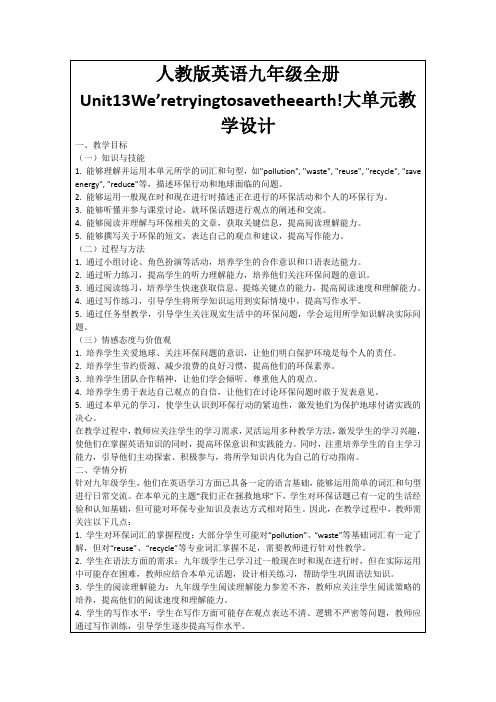
3.通过讨论,教师引入本单元的主题:“We’re trying to save the earth!”(我们正在尝试拯救地球),并简要介绍本节课的学习目标。
6.拓展延伸:鼓励学生在课后进行环保主题的研究,如调查身边的环保行为、采访环保人士等,将学习延伸到课堂之外。
四、教学内容与过程
(一)导入新课
在这一阶段,教师将采用多媒体资源和生活实例来导入新课,激发学生的学习兴趣和参与热情。
1.教师展示一系列关于地球环境问题的图片和视频,如森林砍伐、海洋污染、空气污染等,引导学生关注这些问题的严重性。
教学设想:通过词汇卡片、小组竞赛、情景剧等形式,让学生在实际语境中反复练习,加深记忆。
2.语法运用:现在进行时在描述正在进行的环保活动中的应用,以及一般现在时在陈述环保事实和习惯中的应用。
教学设想:设计语法练习,如填空、改错、句型转换等,帮助学生掌握语法规则,并通过真实的语境任务进行巩固。
3.阅读理解:提取文章主旨,理解作者观点,分析环保问题的原因和解决方案。
4.写作任务:请学生撰写一篇关于“我如何为地球环境保护做贡献”的短文,要求他们运用课堂所学的写作技巧,表达自己的观点和建议。
5.环保实践:鼓励学生在家中或学校进行一项环保实践活动,如回收废旧物品、节约用水用电等,并记录下来,在下一节课与同学分享。
6.家庭作业:布置一份综合性的家庭作业,结合本单元所学内容,要求学生观察并记录身边的环保行为,采访家人或朋友对环保的看法,整理成一篇小报告。
在教学过程中,教师应充分了解学生的学情,结合他们的需求和兴趣,设计有针对性的教学活动,激发学生的学习兴趣,提高他们的英语素养和环保意识。
部编版初中英语九年级Unit13We'retryingtosavetheearth!必背
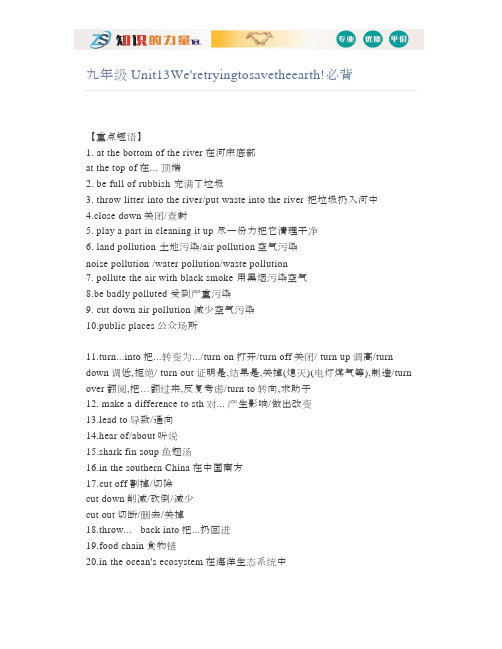
九年级Unit13We'retryingtosavetheearth!必背【重点短语】1. at the bottom of the river在河床底部at the top of在... 顶端2. be full of rubbish 充满了垃圾3. throw litter into the river/put waste into the river 把垃圾扔入河中4.close down关闭/查封5. play a part in cleaning it up 尽一份力把它清理干净6. land pollution 土地污染/air pollution空气污染noise pollution /water pollution/waste pollution7. pollute the air with black smoke 用黑烟污染空气8.be badly polluted 受到严重污染9. cut down air pollution 减少空气污染10.public places公众场所11.turn...into把...转变为.../turn on打开/turn off关闭/ turn up调高/turn down调低,拒绝/ turn out证明是,结果是,关掉(熄灭)(电灯煤气等),制造/turn over翻阅,把…翻过来,反复考虑/turn to转向,求助于12. make a difference to sth对... 产生影响/做出改变13.lead to导致/通向14.hear of/about听说15.shark fin soup鱼翅汤16.in the southern China在中国南方17.cut off割掉/切除cut down削减/砍倒/减少cut out切断/删去/关掉18.throw... back into把...扔回进19.food chain食物链20.in the ocean's ecosystem在海洋生态系统中21.be endangered濒临灭绝22.in this industry在这个行业23.the number of...,... 的数量a number of...,大量的...24.fall/drop by 下降了fall/drop to下降到25.in the last 20 to 30 years在过去的二三十年里26.environmental protection groups环保组织27.teach the public about finning教导公众有关割鳍28.develop laws完善法律29.scientific studies科学研究30. improve the environment改善环境31.take action to do sth.采取行动去做……32.can't afford to wait等不起33.begin with从...开始34.save electricity省电35.turn off the lights关灯36.reusable bags可重复使用的袋子/环保袋37. pay for 付费38. add up累加/合计39.do...instead of doing...做...而不是做...40.stop riding in cars不要开车出行41. use public transportation 使用公共交通42. recycle books and paper 回收书和废纸43. use paper napkins 使用纸巾44. turn off the shower 关掉淋浴/喷头45. rethink, reuse, recycle反思,回收,再利用46.think about考虑47.put...to good use把…很好地利用/充分利用...48.have a creative mind有创造性的思维49.build herself out of rubbish用垃圾建造自己的房子50.pull down拆毁51.turn...upside down把…上下颠倒/倒置52.win a prize获奖53.help save our planet society帮助拯救我们地球社会54.be an inspiration to us all鼓舞了我们所有人55.set up a website建立网站56.art pieces艺术品57. bring back to life使复生/复活58.with a little creativity用一点点创造力【重点句型】1. Even the bottom of the river was full of rubbish. 甚至河底都充满垃圾。
人教版英语九年级全册Unit13We'retryingtosavetheearth单元优秀教学案例

3.问题导向教学,培养批判性思维
本案例采用问题导向的教学策略,引导学生围绕环保问题展开思考、讨论和分析。这种教学方式有助于培养学生的批判性思维,使他们学会独立思考问题,形成自己的观点。
-结合课本对话和文章,让学生在实际语境中学习语法。
3.通过听力练习,让学生熟悉与环保相关的新闻报道、故事和对话,提高他们的听力水平。
-播放听力材料,引导学生完成相关练习,并针对难点进行讲解。
(三)学生小组讨论
1.将学生分成小组,每组选择一个环保主题,如:气候变化、水资源保护等,进行资料收集和讨论。
-要求学生用英语记录关键信息,为后续的展示做准备。
1.设计反思性问题,如:“在本章节的学习中,你学到了哪些环保知识?”“你认为自己在环保方面有哪些改变?”等,引导学生进行自我反思。
2.组织学生进行同伴评价,让他们互相提出建议,共同进步。
3.教师对学生进行综合评价,关注学生在知识、技能、情感态度与价值观等方面的表现,鼓励他们持续进步。
四、教学内容与过程
人教版英语九年级全册Unit13We'retryingtosavetheearth单元优秀教学案例
一、案例背景
随着社会的快速发展,环境问题已经成为全球关注的焦点。在这样的背景下,人教版英语九年级全册Unit13"We're trying to save the earth"单元,以环境保护为主题,旨在培养学生对环境问题的关注和责任感。本案例将结合课本内容,通过多元化的教学活动,提高学生对环境保护的认识,激发他们积极参与环保行动的热情。在教学过程中,注重运用教育专业用词,以人性化的语言引导学生进行思考与讨论,使他们在掌握英语知识的同时,也能够关注到地球的可持续发展。
人教版英语九年级全册unit13We’retryingtosavetheearth
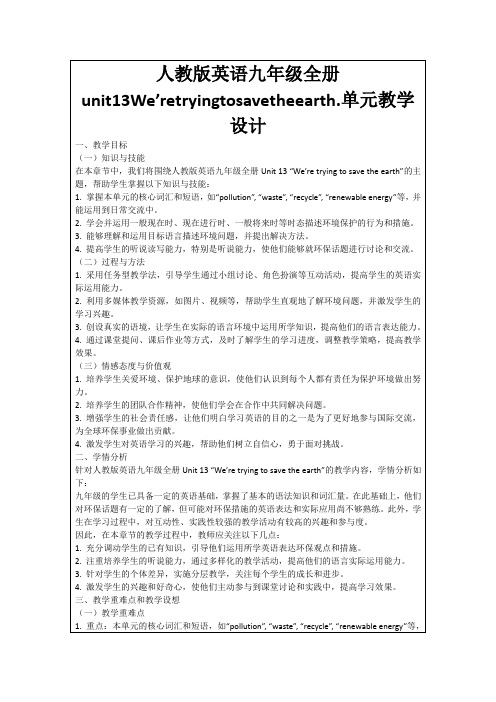
设计意图:通过图片展示,让学生直观地感受到环境问题的严重性,为新课的学习做好情感铺垫。
2.教学活动:教师引导学生讨论以下问题:What do you see in these pictures? How do you feel about it? Do you think it's important to protect the environment?
2.培养学生的团队合作精神,使他们学会在合作中共同解决问题。
3.增强学生的社会责任感,让他们明白学习英语的目的之一是为了更好地参与国际交流,为全球环保事业做出贡献。
4.激发学生对英语学习的兴趣,帮助他们树立自信心,勇于面对挑战。
二、学情分析
针对人教版英语九年级全册Unit 13 “We’re trying to save the earth”的教学内容,学情分析如下:
人教版英语九年级全册unit13We’retryingtosavet
在本章节中,我们将围绕人教版英语九年级全册Unit 13 “We’re trying to save the earth”的主题,帮助学生掌握以下知识与技能:
1.掌握本单元的核心词汇和短语,如“pollution”, “waste”, “recycle”, “renewable energy”等,并能运用到日常交流中。
设计意图:激发学生的创作兴趣,提高他们的审美和动手能力。
设计意图:锻炼学生的书面表达能力,使他们能够运用所学知识阐述自己的观点。
2.口语作业:学生以小组为单位,录制一段关于环保的对话或访谈,讨论如何在学校或家庭中实施环保措施。要求每个成员都有发言机会,对话中需包含本节课所学的词汇和时态。
人教版九年级英语全册Unit13We’retryingtosavetheearth!优秀教学案例

3.学生能够理解课文内容,把握文章结构和主旨,提高他们的阅读理解能力。
4.学生能够通过模仿、角色扮演等方式,运用本课所学知识进行情景交际,提高他们的口语表达能力。
(二)过程与方法
1.学生通过自主学习、合作探讨等方式,分析课文内容,提高他们的自主学习能力和合作精神。
2.教师批改作业,了解学生的学习情况,对学生的进步给予肯定和鼓励,对需要改进的地方提出建议和指导。
3.学生根据教师的反馈,进行自我反思,调整学习方法,不断提高自己的学习效果。
五、案例亮点
1.情景创设:通过播放环保主题的视频和图片,让学生直观地感受到环境问题的严重性,激发他们的学习兴趣和环保意识。这种情景创设的方式不仅有助于吸引学生的注意力,而且能够使学生更加关注环保问题,从而提高他们的学习积极性和参与度。
2.问题导向:设计一系列与课文内容相关的问题,引导学生通过阅读、讨论等方式寻找答案,提高他们的阅读理解和思维能力。问题导向的教学策略有助于培养学生的批判性思维和问题解决能力,使他们在解决问题的过程中更好地理解和掌握知识。
3.小组合作:将学生分成小组,让他们共同完成环保主题的项目,如设计环保标语、制作环保宣传册等。小组合作的方式有助于培养学生的团队合作能力和创新精神,同时也能够提高他们的口语表达能力和交际技巧。
2.设计环保主题的场景,让学生参与其中,如模拟垃圾分类、能源节约等,让学生在实际操作中学习环保知识。
3.创设问题情境,让学生思考环保与生活的关系,如“你觉得我们应该如何减少塑料污染?”等,引导学生主动探索答案。
(二)问题导向
1.设计一系列与课文内容相关的问题,引导学生通过阅读、讨论等方式寻找答案,提高他们的阅读理解和思维能力。
人教版新目标英语九年级Unit13We27retryingtosavetheearthSection

tionA3a-3b
Every species has its own reason to survive. Now that we human
['spi:ʃi:z]
ቤተ መጻሕፍቲ ባይዱ
appeared on the earth, we should live in harmony with everything lives
1.be polluted 2.burn coal 3.too much 4.throw away 5. turn...into... 6.around here 7.be able to 8.solve a/the problem 9.cut down air pollution 10.take the bus or subway 11.instead of
the cans; turn off the lights when you leave a room; use paper or resusable bags; recycle books and paper; turn off the shower when you wash your hair; don't use napkins; rethink, reuse, recycle ... ...
tionA3a-3b
The earth is badly polluted. Please think of the ways that we can do.
人教版新目标英语九年级 Unit13We27retryingtosavetheearthSec
tionA3a-3b
人教版英语九年级Unit13《We’retryingtosavetheearth》全单元说课稿
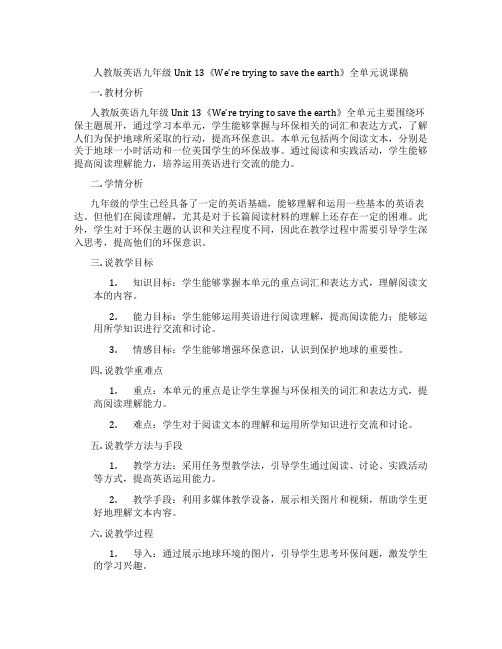
人教版英语九年级Unit 13《We’re trying to save the earth》全单元说课稿一. 教材分析人教版英语九年级Unit 13《We’re trying to save the earth》全单元主要围绕环保主题展开,通过学习本单元,学生能够掌握与环保相关的词汇和表达方式,了解人们为保护地球所采取的行动,提高环保意识。
本单元包括两个阅读文本,分别是关于地球一小时活动和一位美国学生的环保故事。
通过阅读和实践活动,学生能够提高阅读理解能力,培养运用英语进行交流的能力。
二. 学情分析九年级的学生已经具备了一定的英语基础,能够理解和运用一些基本的英语表达。
但他们在阅读理解,尤其是对于长篇阅读材料的理解上还存在一定的困难。
此外,学生对于环保主题的认识和关注程度不同,因此在教学过程中需要引导学生深入思考,提高他们的环保意识。
三. 说教学目标1.知识目标:学生能够掌握本单元的重点词汇和表达方式,理解阅读文本的内容。
2.能力目标:学生能够运用英语进行阅读理解,提高阅读能力;能够运用所学知识进行交流和讨论。
3.情感目标:学生能够增强环保意识,认识到保护地球的重要性。
四. 说教学重难点1.重点:本单元的重点是让学生掌握与环保相关的词汇和表达方式,提高阅读理解能力。
2.难点:学生对于阅读文本的理解和运用所学知识进行交流和讨论。
五. 说教学方法与手段1.教学方法:采用任务型教学法,引导学生通过阅读、讨论、实践活动等方式,提高英语运用能力。
2.教学手段:利用多媒体教学设备,展示相关图片和视频,帮助学生更好地理解文本内容。
六. 说教学过程1.导入:通过展示地球环境的图片,引导学生思考环保问题,激发学生的学习兴趣。
2.阅读理解:学生自主阅读文本,回答相关问题,教师进行讲解和指导。
3.小组讨论:学生分组讨论,分享各自的观点和感受,教师进行巡回指导。
4.实践活动:学生根据所学内容,进行角色扮演或写作练习,教师进行评价和指导。
九年级英语人教版全一册Unit13We’retryingtosavetheearth!优秀教学案例

(二)问题导向
1.教师可以提出一些与环境问题相关的问题,引导学生进行思考和讨论,如“为什么我们需要保护环境?”“我们能为环保做些什么?”等。
2.教师可以设计一些探究性任务,让学生通过查阅资料、进行实地调查等方式,寻找答案,提高他们的自主学习能力。
3.教师可以组织学生进行小组讨论,让他们分享自己的观点和经验,培养他们的团队合作精神。
(三)学生小组讨论
在学生掌握了一定的环保知识和表达方式后,我会组织他们进行小组讨论。我会提出一些与环境问题相关的问题,如“为什么我们需要保护环境?”“我们能为环保做些什么?”等,让学生在小组内进行思考和讨论。此外,我还会设计一些探究性任务,让学生通过查阅资料、进行实地调查等方式,寻找答案,提高他们的自主学习能力。
1.学生能够认识到环保的重要性,增强环保意识,树立人与自然和谐共生的观念。
2.学生能够理解个人在环保方面可以做出的努力,并积极行动起来,为保护地球贡献自己的力量。
3.学生能够在学习过程中,培养积极向上的学习态度,树立自信心,养成良好的学习习惯。
作为一名特级教师,我深知教学目标的重要性,因此在教学过程中,我会不断调整和优化教学策略,以确保学生能够达到上述教学目标。同时,我也注重激发学生的学习兴趣,让他们在学习过程中感受到英语的魅力,从而提高他们的学习积极性。在教学评价方面,我会采用多元化的评价方式,全面评估学生的知识掌握和能力发展,为他们的英语学习提供更有针对性的指导。
九年级英语Unit13《We27retryingtosavetheearth》知识点
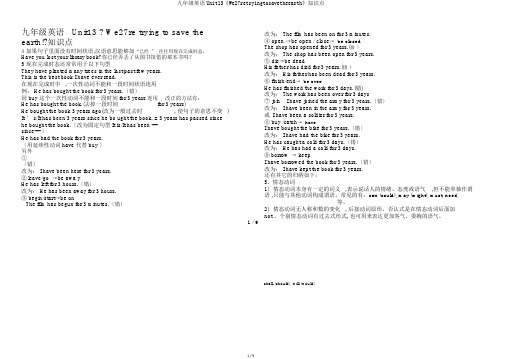
九年级英语Unit13 ? We27re trying to save the earth!?知识点4 如果句子里面没有时间状语,汉语意思能够加“已经〞,往往用现在完成时态。
Have you lost your library book?你已经弄丢了从图书馆借的那本书吗?5现在完成时态还常常用于以下句型They have planted many trees in the last/past few years.This is the best book I have ever read.在现在完成时中,一次性动词不能和一段时间状语连用例: He has bought the book for 3 years.〔错〕因 buy 这个一次性动词不能和一段时间for 3 years连用,改正的方法有:He has bought the book.(去掉一段时间for 3 years)He bought the book 3 years ago(改为一般过去时, 使句子的意思不变) It ’ s/It has been 3 years since he bo ught the book. = 3 years has passed since he bought the book.〔改为固定句型It is/It has been ---since--- 〕He has had the book for 3 years.〔用延续性动词have 代替 buy 〕另外①〔错〕改为: I have been here for 3 years.②leave/go →be awa yHe has left for 3 hours.〔错〕改为: He has been away for 3 hours.③ begin/start→be onThe film has begun for 3 minutes.〔错〕改为: The film has been on for 3 minutes.④ open →be open / close→ be closedThe shop has opened for 3 years.(错)改为: The shop has been open for 3 years.⑤ die→be deadHis father has died for 3 years.(错)改为: His father has been dead for 3 years.⑥ finish/end→ be overHe has finished the work for 3 days.(错)改为: The work has been over for 3 days⑦ join I have joined the army for 3 years.〔错〕改为: I have been in the army for 3 years.或I have been a soldier for 3 years.⑧ buy /catch→ haveI have bought the bike for 3 years.〔错〕改为: I have had the bike for 3 years.He has caught a cold for 3 days.〔错〕改为: He has had a cold for 3 days.⑨borrow → keepI have borrowed the book for 3 years.〔错〕改为: I have kept the book for 3 years.还有其它的归纳如下:5.情态动词1)情态动词本身有一定的词义 ,表示说话人的情绪、态度或语气 ,但不能单独作谓语 ,只能与其他动词构成谓语。
- 1、下载文档前请自行甄别文档内容的完整性,平台不提供额外的编辑、内容补充、找答案等附加服务。
- 2、"仅部分预览"的文档,不可在线预览部分如存在完整性等问题,可反馈申请退款(可完整预览的文档不适用该条件!)。
- 3、如文档侵犯您的权益,请联系客服反馈,我们会尽快为您处理(人工客服工作时间:9:00-18:30)。
九年级英语Unit13 《 We27re trying to save the earth!》知识点4 如果句子里面没有时间状语,汉语意思能够加“已经”,往往用现在完成时态。
Have you lost your library book?你已经弄丢了从图书馆借的那本书吗?5现在完成时态还常常用于下列句型They have planted many trees in the last/past few years.This is the best book I have ever read.在现在完成时中,一次性动词不能和一段时间状语连用例: He has bought the book for 3 years.(错)因 buy 这个一次性动词不能和一段时间for 3 years连用,改正的办法有:He has bought the book.(去掉一段时间for 3 years)He bought the book 3 years ago(改为一般过去时, 使句子的意思不变) It ’ s/It has been 3 years since he bo ught the book. = 3 years has passed since he bought the book.(改为固定句型It is/It has been --- since--- )He has had the book for 3 years.(用延续性动词have 代替 buy )另外①(错)改为: I have been here for 3 years.②leave/go →be awa yHe has left for 3 hours.(错)改为: He has been away for 3 hours.③ begin/start→be onThe film has begun for 3 minutes.(错)改为: The film has been on for 3 minutes.④ open →be open / close→ be closedThe shop has opened for 3 years.(错)改为: The shop has been open for 3 years.⑤ die→be deadHis father has died for 3 years.(错)改为: His father has been dead for 3 years.⑥ finish/end→ be overHe has finished the work for 3 days.(错)改为: The work has been over for 3 days⑦ join I have joined the army for 3 years.(错)改为: I have been in the army for 3 years.或I have been a soldier for 3 years.⑧ buy /catch→ haveI have bought the bike for 3 years.(错)改为: I have had the bike for 3 years.He has caught a cold for 3 days.(错)改为: He has had a cold for 3 days.⑨borrow → keepI have borrowed the book for 3 years.(错)改为: I have kept the book for 3 years.还有其它的归纳如下:5.情态动词1)情态动词本身有一定的词义 ,表示说话人的情绪、态度或语气 ,但不能单独作谓语 ,只能与其他动词构成谓语。
常见的有:can (could), may (might), must, need,等。
2)情态动词无人称和数的变化 , 后接动词原形。
否定式是在情态动词后面加not 。
个别情态动词有过去式形式, 也可用来表达更加客气、委婉的语气。
shall (should), will (would)1.can 和 could 的用法(1)can/could 表示“能力;可;可能性”等。
could can 的去式。
如: CanI use your bike?(2)can 用在疑句中 ,表示征求意、求可,答仍用can; could 用在疑句中 ,比 can 更委婉、客气 ,是一种礼貌的法, 并不表示去 ,答用 can, 而不能用 could 。
如:—Could you tell me the way to the zoo? — Sorry. I can't. I'm new here 。
[注意 ] can 和 could 只能用于在和去两种,将来中用 be able to。
另外 , can't 可表示否定推。
如: That ______ be Mr Wang. He has goneto Beijing 。
2.may 和 might 的用法may/might 意“可以”,表示同意、可或求方可,也可表示祝愿。
may 的否定形式may not 。
might 是 may 的去式 ,有两种用法:一种表示去式;一种表示虚气,使气更加委婉、客气,或表示可能性更小。
以may 开的一般疑句 ,其否定回答用mustn't,而不用may not 。
如: ______ I use your pen? 我可以用你用的笔?You may put on more clothes. May you be happy!Might I borrow some money now?He might be alive.3.must 的用法must意“必,一定,准是”,表示人有必要做某事, 或命令、要求人做某事以及事物的推。
否定形式mustn't,表示“不得”一,“定不要”。
如:I ______ finish my work today。
You mustn't drive after drinking。
(1)must 与 have to 的区: must 表示人的主意愿; have to 表示客需要。
如:I must do my homework first。
It is raining hard outside; I _____ stay athome 。
(2)回答由 must 引的疑句的提①肯定回答: Yes, ⋯must. 如:— Must I go home now? — Yes, you must. ②否定回答:No,⋯needn't./No,⋯don't/doesn't have to.— Must I go home now? — No, you __ ____.(3)must 表示事物的推 ,意“想必;一定”,只用于肯定句中;表“推” ,情与原形 ,(常 be )用 ,如: The man must be our teacher 。
4.need 的用法(1)need表示“需要,必”,主要用于否定句和疑句中。
其否定形式needn't, 表示“没有必要 ,不必”;由 need 构成的疑句行回答 ,其肯定回答用 must, 否定回答用needn't 。
如— Need we do some cleaning now?— Yes, you must. — No, you needn't.(2)need可作,常用于下列构:①人: need to do sth“需要做某事”。
如I need to learn more.②物: need doing“某物需要被做”=need to be done。
如: My hair needs cutting. =My hair needs to be cut.③ need + 名或代。
如:All living things need water.5.shall 和 should 的用法shall 用于第一人称的句子中,表示提建或求;should 用于各种人称的句子中,或任 ,意“ ”。
如: ______ we go out for a walk?You should study hard at school。
should have done主要有两个用法:用于推去已生的情况。
如:He should have arrived by now.用于指本生而上未生的情况。
如:You should have told me so before.6.will 和 would 的用法will 用于第二人称疑句,表示征求意或提建;would will 的去式 ,可用于多种人称,表示意愿。
如:Will you have a little soup?would have done主要有两个用法:表“猜去”I guess the poet would have been about twenty when she wrote her first poem.表“ 去本会生 ,而并未生”,没有之意。
I would have written before but I have been ill.本来我是会写信的,但是由于我生病了。
(用来明某一情况,没有之意)7.have tohave to的述句形式肯定式: have to +原形I have to tidy my room.我得整理房.否定式: don't (doesn't) + have to +原形You don't have to go if you don't want to.have to的一般疑句形式及略答have to 的一般疑形式必借助助do 或 does :Do you have to look after your sister? Yes,I do./ No,I don't.have to的特殊疑句形式What do you have to do on Sundays?have to可用于各种A、一般在:I have to visit Mr Wang.B、一般去:That night we had to walk home because there was no bus.C、一般将来:We'll have to ask Zhang Ming instead.D、与 may 用: I think he may have to help his Dad in the garden.8.ought toought to 的肯定式当,You don't look well. You ought to go to see the doctor.ought to 的否定式和疑式ought to 的否定形式是 ought 后直接加 not 构成 ,其否定形式可写 oughtn't 。
